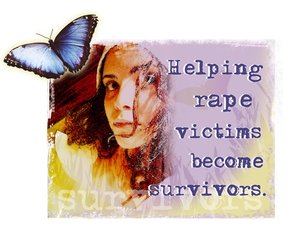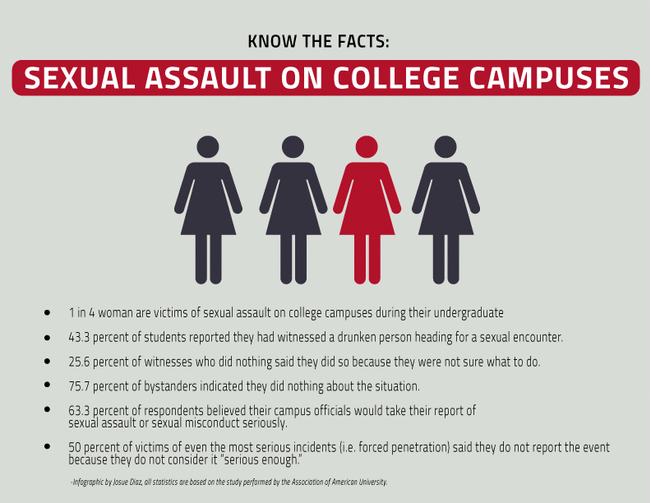"Who is more at risk for being sexually assaulted on Campus?"
Students who are isolated or spend a lot of time alone
Students who are intoxicated or under the influence
Students who have been previously victimized
Students with mental or physical disabilities
Students that are new to the campus
Students who are isolated or spend a lot of time alone
Students who are intoxicated or under the influence
Students who have been previously victimized
Students with mental or physical disabilities
Students that are new to the campus

"Reasons for NOT REPORTING"
72% didn't think the incident was serious enough to report
55% weren't clear of harm was intended
47% didnt want action to be taken
44% felt partially responsible
40% the perpetrator was a friend

How do I support a Sexual Assault Victim?"
1. Believe them! Listen & Be Supportive. (Promotes Sanity & Safety)
2. Let them know that anything they tell you will stay between the two of you. (Builds Trust)
3. Make sure they are/feel safe. (Promotes Safety, Comfort, Trust)
4. Allow them to decide if they want to get medical care or report the assault. Talk with them about preserving evidence, (keeping the clothes they were assaulted in, not showering, not brushing teeth, putting soiled clothing in a PAPER bag, NOT PLASTIC etc.), getting a medical exam, (which doesn't mean they have to report it to the police) They may want to think about pregnancy, HIV, STD's. (Promotes Empowerment)
5. Let them work through their feelings in their own time. (Promotes Empowerment)
6. Let them know that what they are feeling is completely "normal" (Promotes Soundness of Mind)
7. Let them make any decisions on their own & support those decisions. (Promotes Empowerment)
8. Continue to reassure them that you are there for them. (Builds Trust)
1. Believe them! Listen & Be Supportive. (Promotes Sanity & Safety)
2. Let them know that anything they tell you will stay between the two of you. (Builds Trust)
3. Make sure they are/feel safe. (Promotes Safety, Comfort, Trust)
4. Allow them to decide if they want to get medical care or report the assault. Talk with them about preserving evidence, (keeping the clothes they were assaulted in, not showering, not brushing teeth, putting soiled clothing in a PAPER bag, NOT PLASTIC etc.), getting a medical exam, (which doesn't mean they have to report it to the police) They may want to think about pregnancy, HIV, STD's. (Promotes Empowerment)
5. Let them work through their feelings in their own time. (Promotes Empowerment)
6. Let them know that what they are feeling is completely "normal" (Promotes Soundness of Mind)
7. Let them make any decisions on their own & support those decisions. (Promotes Empowerment)
8. Continue to reassure them that you are there for them. (Builds Trust)
